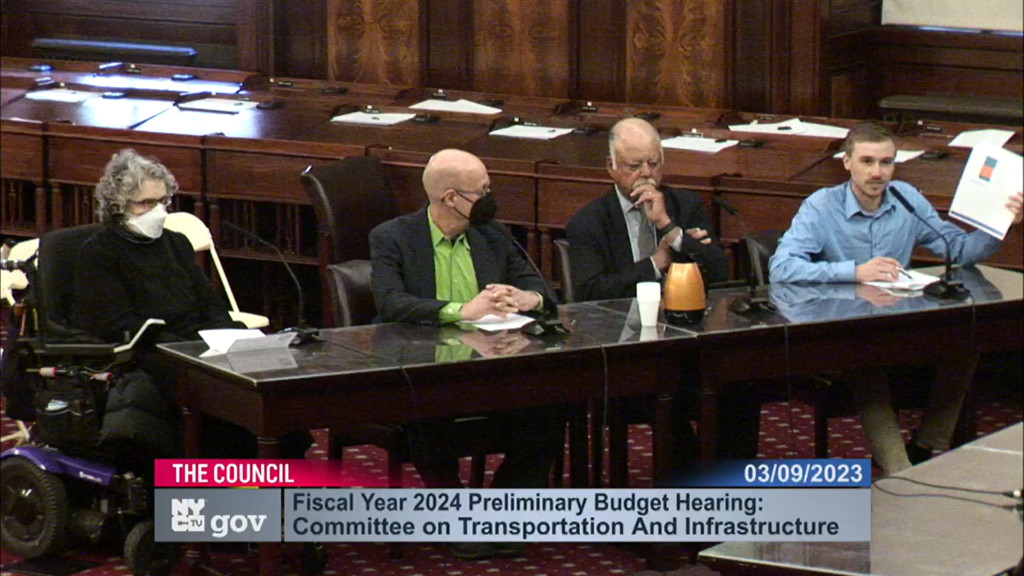Without Funding for the MTA, Service— and Riders— will Suffer.
PCAC testified at the City Council Preliminary Budget Hearing on Transportation and Infrastructure to call on Councilmembers to support efforts to fund and improve the MTA for its millions of riders around the city:
“Good morning. My name is Liam Blank, Associate Director of the Permanent Citizens Advisory Committee to the MTA, PCAC, an independent organization established by the State Legislature in 1981. As the coordinating body for three rider councils, our mission is to give subway, bus, and commuter rail riders a voice in the formulation and implementation of MTA policy, to hold the MTA Board and MTA management accountable to riders, and to advocate on their behalf, as we are doing today.
“Driven in large part by the precipitous drop in ridership both during and after the pandemic, the MTA is facing a huge deficit that will lead to devastating cuts in bus, subway, and rail service, or crippling fare increases if not addressed. We are reassured that you understand the severity of the situation and know that none of us want to see the horrific fare hikes and horrendous service cuts that could be the unfortunate reality without adequate funding ‒ and which would have far-reaching negative consequences for the city and region, and for riders themselves. It is imperative that you, our leaders in the City Council, work together and with the State to ensure that transit is fully funded both this year and into the future.
“To this end, we support the funding proposals that Governor Hochul put forth in her Executive Budget as a great starting point for budget negotiations. This includes asking the city to pay more to fully fund Access-A-Ride and cover the current costs of student MetroCards, as well as to help the State offset revenue losses that result from exemptions to the PMT. The transit system is the backbone of the city and its economy, so it’s critical for the city to contribute to its long-term operations. Without this financial lifeline, the millions of New Yorkers who depend on transit daily will bear the costs. That is why we are strong supporters of Fair Fares and baselining $75 million for the program – and also why we strongly support doubling eligibility to 200 percent of the federal poverty level so that many more people can take advantage of this lifeline. We would also like to see Fair Fares implemented on commuter rail, so that riders who have access to the LIRR and Metro-North, but not a subway, could ride at half the cost of an Atlantic Ticket or City Ticket. Including the option to purchase a weekly MetroCard with the expanded City Ticket – as we propose in our Freedom Ticket recommendations – would further open transit to New Yorkers who live in subway deserts.
“Bus lanes and bus lane enforcement are a crucial part of creating a better and more equitable transit system, and essential for connecting people to subways, commuter trains – and jobs. As the MTA continues to work towards improving bus service, riders need the city to do its part to speed up buses by rolling out more and better bus lanes and improving enforcement. Buses are the engine of equity around our city, and the city has a unique ability to improve this part of our transit system.
“Access to transit is access to opportunity. New Yorkers need and deserve safe, reliable and affordable service. But without funding, that will diminish for all of us. There is an urgent need. Not just this year’s budget, but enough to address the long-time structural issues as well.
“But even beyond the Governor’s proposals focused on the city, we believe that there are additional revenue alternatives that are worth including in the conversation. We have testified repeatedly to the state legislature about the dozens of options that could be used to raise billions for transit, including options that the city can enact. On our website at www.PCAC.org is a list of sourced additional potential funding alternatives in the form of a funding tool that allows you to consider different combinations of revenue streams.
“Some additional funding options for the city to fund transit include:
- New city income tax bracket for high-income earners in NYC – $600 million
- Pricing half of on-street parking spaces for an average $5.50/day – $3 billion
- Implement PILOTs for private hospitals and higher education institutions – $842 million
- City mansion tax – $270 million
- 1 cent/ounce tax on sweetened beverages in NYC – $288 million
“As we work to rebuild and recover from the pandemic, it is crucial that we prioritize the needs of transit riders and invest in the infrastructure that makes it all possible. Public transit is essential to the success and vitality of New York City, connecting millions of New Yorkers to their jobs, schools, and communities. Funding transit means investing in the riders who move our region, including many who cannot afford to drive or take other modes of transportation. With more investment in the MTA for better service, even more riders will discover that transit is truly the best, safest, and most reliable way to get around.”
